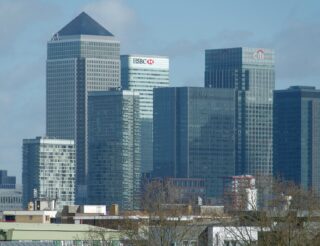Multiple conflicts of interest between HSBC and a number of British media outlets have raised concerns that the banking giant has the ability to manipulate news stories about serious allegations of fraud both in the UK and overseas.
HSBC has faced investigation for fraudulent activity on several different fronts in recent years. It was revealed last year that the bank’s Swiss arm had been systematically helping wealthy clients to circumvent domestic tax authorities. They paid $1.9 billion to settle a US probe in 2012 for laundering billions of dollars of Mexican and Columbian drug money. In 2013 they were ordered to pay $2.5 billion in damages and interest for misleading investors about practices of predatory lending.
And in the UK, in December 2015, the Financial Conduct Authority (FCA) decided to launch an investigation into HSBC for overcharging hundreds of thousands of ordinary Britons already struggling with credit card payments.
The whistleblower responsible for bringing the credit card fraud to the public, Nicholas Wilson, has been campaigning for over twelve years to bring HSBC to account for a fraud he claims the bank leadership had ignored for years.
“HSBC desperately needs to keep this out of the news”
Wilson worked as a lawyer in a firm responsible for collecting debts for HFC, a now-defunct bank that was purchased by HSBC in 2006. He noticed at the time that HFC was marking up “collection charges” of 16.4% on top of people’s debts, illegally, but after he repeatedly challenged bosses on it, “they sidelined me. They hung me out to dry. They sacked my team”.
As part of his public campaigning, Mr. Wilson has paid close attention not only to the alleged $1.4 billion fraud itself, but to the way in which HSBC’s case is presented in the UK media and the shared interests of those who fail (or flat out refuse) to report on it.
He told the Leveller “HSBC desperately needs to keep this out of the news”, adding “it could affect their license in the US”. And he and his supporters believe that HSBC is manipulating its financial and political ties throughout the media to make sure this happens.
News media advertisers have on more than one occasion felt entitled to dictate editorial policy to a supposedly free press
Last year, the Daily Telegraph’s chief political commentator and star columnist, Peter Oborne, made a very public resignation on the grounds that HSBC, one of the main purchasers of advertising in the Telegraph, was using its economic clout in the newspaper to stop it from reporting on the then-ongoing Swiss fraud scandal.
Oborne’s resignation left many wondering the extent to which HSBC’s alleged advertising behavior was not unique in the industry. Oborne claimed at the time that HSBC was not the only company to behave in this way towards the Telegraph, implicating Tesco and Cunard as well.
And in February this year, Lucy Kellaway of the Financial Times was threatened by advertising client HP after writing something they didn’t approve of that “FT management should consider the impact of unacceptable biases on its relationships with advertisers”. With the support of her editors, Kellaway published HP’s threats and refused to change her position, but the case demonstrates that news media advertisers have on more than one occasion felt entitled to dictate editorial policy to a supposedly free press.
The Guardian, too, chose to stand up to HSBC after they began to report on their ‘HSBC Files’ series, which focuses on the Swiss fraud scandal. Following the publication of a front page article which revealed data from whistleblower Hervé Falciani, the Guardian was informed by HSBC that they were suspending their advertising relationship with the paper indefinitely.
HSBC’s Swiss account holders have given millions in political donations to the Conservative Party
At a time when newspaper circulation is falling globally, the incentive for media outlets to retain income from advertising clients is greater than ever. In 2014, HSBC spent approximately $7.2 million on advertising in British news media.
Wilson’s own case has been frustrated by what he believes is a stitch-up by powerful interests. He had been in contact with Tom Harper, home affairs correspondent of the Sunday Times (owned by right wing media magnate Rupert Murdoch), and was due to have his story printed in the paper in February 2015.
At the same time as the piece was being written up, the Sunday Times’ Associate Editor, Camilla Cavendish, was a guest at Chequers (the official country retreat of the British Prime Minister). The day before the piece was due to be published, Harper informed Wilson that the story was not going to go ahead after all, and when pressed for details refused to tell Wilson why the story had been spiked.
The BBC’s slender coverage of HSBC’s numerous fraud scandals has been called into question
In May of that year, Cavendish took a job as head of no. 10 Downing Street’s policy unit. David Cameron’s government has, since coming to power in 2010, failed to dispel repeated accusations of working in favor with HSBC, whose Swiss account holders have given millions in political donations to the Conservative Party.
HSBC also has a sponsorship deal with the Sunday Times.
Wilson and others have also raised concerns about breaches in the BBC’s mandate for political impartiality since the appointment of Rona Fairhead to Chair of the BBC Trustees, the governing body of the state-owned broadcaster. Fairhead has sat on the board of HSBC since 2004, and is still a non-executive director whose income from the bank in 2014 was approximately $745,000. The BBC’s slender coverage of HSBC’s numerous fraud scandals has been called into question, particularly since Fairhead was grilled by Members of Parliament in March last year and told by angry Labour MPs that she ought to resign.
A clerical error in January led to Fairhead’s office passing an email from Erik Sandberg, a supporter of Wilson, onto HSBC without Sandberg’s consent, and without the email having explicitly mentioned HSBC but having referred to Fairhead’s exposure to claims of conflicts of interest. This could constitute a possible breach of the Data Protection Act, and the BBC Trust is yet to rule out that this was intentional. Wilson also claims on his blog that Fairhead’s hasty appointment to head the BBC Trust may have been illegal.
Protesters and campaigners show no signs of letting up on scrutinizing the extent to which HSBC is able to influence news coverage of fraud allegations, as long as these and other conflicts of interest between the banking giant and the media continue to exist.
Image: Matt Buck



